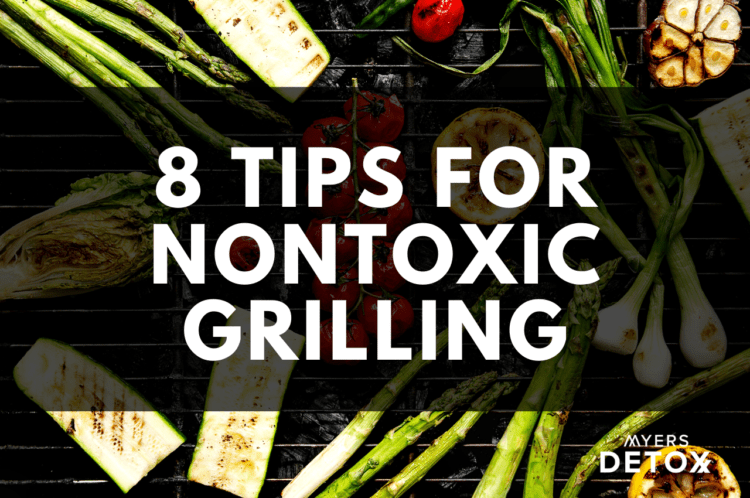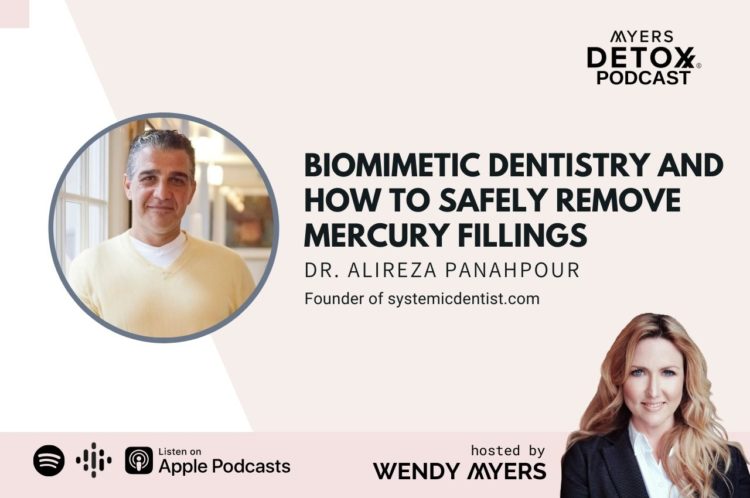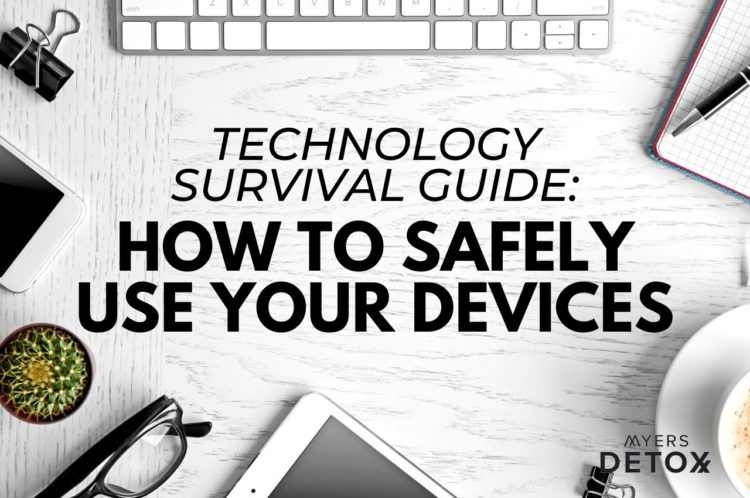8 Tips for Nontoxic Grilling

It’s that time of year again — grilling season. There’s nothing quite like firing up the grill on a summer night, inviting over a few friends, and enjoying a little BBQ.
Yes, summer is for grilling and gatherings. And while this all sounds well and good, even the best of times can come with some potential downsides.
Not to rain on your grilling parade, but there are a handful of hazards that can come with your BBQ fun. Does that mean you should sell your grill and call it a day? Absolutely not.
In this article, you’ll learn:
- The harmful compounds produced when you overcook meat (and what this does to your body)
- How to choose healthier animal proteins
- How to choose the right marinade
- How to clean your grill to reduce toxins
- Safe grilling practices to optimize taste while reducing potential hazards
- The cookware to avoid for grilling
8 Tips To Avoid Hidden Health Hazards While You Grill
#1 Stop Using Aluminum Foil
Using aluminum foil to wrap up some veggies as you grill them with butter is standard operating procedure. Nothing is as convenient or seems to hold flavor quite as well as good old aluminum.
But here’s the issue — aluminum is a toxic metal. And yes, it’s true that you’re only using the aluminum to wrap your food, tin foil is a very soft material. Research shows that when you heat aluminum (as you do on the grill), this toxic compound can leach into your food[1].
Now you have a flavorful medley of zucchini, peppers, tomato, and…aluminum.
Some symptoms associated with aluminum exposure include fatigue, bone pain, nausea, mouth ulcers, skin rashes, and arthritic pain. Even more concerning, however, is that some research shows that aluminum exposure may put you at greater risk for developing neurological diseases like Alzheimer’s disease[2]. This , in my opinion, is the greatest risk from aluminum that we are exposed to on a daily basis from so many sources – it’s time to stop using aluminum foil!
#2 Don’t Overcook Your Meat
The whole point of grilling is to give your meat that charred look and flavor. The problem is that char comes at a price. Grilling meat at high temperatures produces compounds called heterocyclic amines (HCAs).
HCAs have been shown to damage DNA and may act as carcinogens. When you overcook your food, it increases the amount of these compounds that are produced, thereby increasing the risk of health complications like cancer [3].
HCAs are formed when the amino acids (building blocks of protein) interact with glucose (sugar), and a substance in muscle meat called creatine at high temperatures. With the common use of sugary marinades and BBQ sauce and the high-heat nature of grilling, this creates the perfect storm for HCA formation.
Therefore, one way to reduce the amount of HCAs formed during grilling is to do a lighter grill, instead of burning or charring your meat.
#3 Choose The Right Marinade
Many store-bought marinades are loaded with sweeteners like high-fructose corn syrup and sugar. These ingredients can enhance the production of HCAs due to their high glucose (sugar) content.
But here’s the good news, some marinades can actually reduce the amount of HCAs formed while you grill — you just need to know which ones to choose. Namely, marinades that are made with an oil or vinegar base are much less HCA forming than thicker sugary marinades.
What’s more, the addition of antioxidant-rich herb blends can further reduce the formation of HCAs, with some research showing up to an 88% reduction.
Antioxidant-rich herbs and spices to include in your marinades include turmeric, garlic, and rosemary[4][5].
You also want to avoid marinades made with GMO industrial seed oils. The biggest culprits here are soy bean oil, corn oil, canola oil, cottonseed and “vegetable” oils. These fats are always rancid and cause inflammation. Industrial seed oils are easily damaged by high temperature and pressure.
When heated to extreme temperatures (like in frying or grilling) they create trans fats that are very harmful to your health. On top of that, chemical solvents are used to extract them. Residues of these toxic solvents are left in the final product.
It’s best to stick to olive oil and make your own marinade as I’ve found most bottled marinades don’t pass all the requirements I listed above.
#4 Clean Your Grill Before and After Cooking
Another potentially dangerous compound that can be produced while grilling is polycyclic aromatic hydrocarbons (PAHs). Unlike HCAs, PAHs aren’t formed in the actual meat but are produced when the fat and juices from your meat drip onto the surface of your grill or fire and cause flames and smoke[6].
Since grilling will naturally produce smoke, anything you can do to reduce the amount of smoke produced during cooking will help to diminish the PAHs produced.
Firing up the grill can be a bit of a chore in and of itself, and for many of us, cleaning the grill is the last thing we want to do after cooking. However, all those charred bits and leftover scraps of meat are only going to add to the amount of smoke produced next time.
To get ahead of a smokey grill, be sure to clean both before and after grilling — it will be worth it in the long run.
You can also cut off some of the excess fat on your meat to reduce the amount of smoke produced from fat drippings.
#5 Pre-Cook Your Meat
Another way to reduce PAH production is to pre-cook your meat before tossing it on the grill. This will reduce the time your meat spends on the grill, as well as the amount of drippings produced while maintaining that chargrilled finish, you know and love.
#6 Choose High-Quality Meat
This may go without saying, but choosing high-quality meat while grilling is essential if you want to avoid the pitfalls of factory-farmed meat.
What does high-quality mean?
Depending on your budget, high-quality can vary quite a bit, but if we’re talking about optimal quality for meat, you should always look for organic, grass-fed beef, and organic, pasture-raised chicken like from US Wellness Meats.
One of the benefits of choosing grass-fed beef is that it is naturally higher in omega-3 fatty acids[15]. Why is this important?
Most modern diets skew higher in omega-6 fatty acids than omega-3 fatty acids (estimated 15:1), while historically it was believed that ratio was closer to 1:1. While both types of fat are essential to health, omega-3 fats are known for their anti-inflammatory activity, while many omega-6 fats can be pro-inflammatory[12].
This doesn’t mean you should avoid omega-6 altogether. However, any opportunity to get more omega-3 and less omega-6 in should be taken.
Animals that are factory farmed not only live unhappy lives, but they’re often treated with hormones and antibiotics to make them grow faster and keep them “healthy.” [7][8]
When you consume meat treated with antibiotics those antibiotics can then directly affect your gut microbiota, throwing it off. Many health professionals agree that a healthy gut microbiome is the cornerstone of health and immunity in your body–when you mess with it by consuming antibiotics you could be setting yourself up for a host of health issues[9].
The antibiotics used in factory farmed meats are also contributing to antibiotic resistant bacteria we see that are causing devastating infections that cannot be treated across the nation. You want to avoid exposure to this bacteria.
Perhaps even more disturbing is the concept of antibiotic resistance. The antibiotics used in factory farmed meats contribute to antibiotic resistant bacteria which, by definition, are resistant to antibiotics. These bacteria cause devastating infections that can’t be treated due to their ability to defeat the drugs developed to kill them. It’s estimated by the CDC that each year at least 2.8 million people are infected with antibiotic resistant bacteria, and more than 35,000 die as a result[13].
Then there is the industry practice of pumping animals full of hormones to make them grow faster. This contributes to YOU also growing more when you consume meat that contains hormones. Men can eventually grow breasts and both men and women can gain weight when eating proteins full of growth hormones for years and years.
With the myriad of hormonal imbalances I see with my clients due to toxic exposure, I can say with absolute certainty the last thing anyone needs is to be getting extra hormones from their meat.
If you’re cooking up a significant amount of beef or chicken for a party or BBQ, do your best to get the highest quality meat you can. With the understanding the organic and pastured proteins can be expensive, the next best tier down would be hormone-free and antibiotic-free meat.
#7 Choose Hot Dogs and Sausages with Natural Preservatives
There is a myriad of options in the meat department when it comes to grilling. Of course, fan favorites are always burgers, sausages, and hot dogs.
We already covered what to look for with burgers (grass-fed and organic). However, the world of sausages and hot dogs offers a whole other set of potentially harmful compounds.
Specifically, these cured meats are often preserved using nitrates or nitrites. Nitrates (and nitrites) can form nitrosamine when cooked at high heat, which is a potentially carcinogenic compound[14].
Luckily, the solution here is simple; buy nitrate-free sausages and hot dogs. There are several brands that use non-nitrate preservatives like celery salt in place of harmful nitrates that you can look for. While many brands will slap the “all-natural” label on their packaging, you want to see “nitrate-free” to ensure you’re buying cured meat that hasn’t been made with nitrates.
#8 Avoid Plastic Utensils and Plates and Non-Stick Cookware
It can be very tempting to go the nonstick route when it comes to cooking. What could be easier than cleaning nonstick cookware? And when it comes to serving up your guests at a BBQ who wants to mess with dishes — why not just grab some styrofoam plates and plastic forks?
Unfortunately, as convenient as the options can be, there are hidden dangers behind nonstick cookware and plastic utensils.
Polytetrafluoroethylene (also known as Teflon or PTFE), is a manmade chemical that provides a frictionless surface that won’t interact with other chemicals. This makes it ideal for nonstick cookware, right? Wrong.
What makes it less than ideal, however, is the fact that this chemical can stick around in the environment and in your body for long periods of time.
Some research shows that exposure to PTFE and similar compounds can lead to childhood obesity, and that these compounds may act as carcinogens[10][11]. That’s a high price to pay to save yourself a little elbow grease in the kitchen.
Get Grilling: Lemon Dill Marinated Chicken
 I don’t know about you, but all this talk of grilling has made me hungry! So I decided to include one of my tried and true marinade recipes that is perfect on a variety of proteins you can throw on the grill!
I don’t know about you, but all this talk of grilling has made me hungry! So I decided to include one of my tried and true marinade recipes that is perfect on a variety of proteins you can throw on the grill!
I use this delicious marinade at least once a week – on everything from chicken, to fish, seafood, steak, pork, and even veggies.
I love the bright, tangy, refreshing flavor of this marinade. And it’s perfect for summer!
Best of all, it’s easy to make! Just whip up in the morning, add your meat, and let it sit in the fridge to marinate until you are ready to grill for dinner. This recipe works anyone on a Modern Paleo or Keto diet.
Ingredients
- 1/4 cup avocado oil (you can substitute extra virgin olive oil if you prefer)
- fresh juice of 1/2 lemon
- 3 teaspoons of fresh dill, chopped (you can use dried dill if fresh is not an option, but I highly re commended using fresh dill, if possible – it really elevates the flavor)
- 1 tablespoon capers
- dash of black pepper, to taste
- 3 tablespoons water
Depending on how much marinade you like to use on your food, this recipe works for approx. 1 1/2 – 2 pounds of protein. If you prefer a little more marinade, I would start by making the recipe as is above and then doubling it if you find you need or want more.
Instructions
- In a medium sized bowl, whisk all ingredients together and pour over your protein of choice. My faves with this marinade are chicken or salmon.
- Marinate for at least 1 hour or up to overnight.
- Heat your grill.
- Discard remaining marinade upon cooking.
- Get grilling! Cook protein until desired doneness
Pro tip: Mix a bit of extra virgin olive oil with capers and a fresh squeeze of lemon juice. Drizzle over your grilled protein upon serving.
Takeaway: Grill Smart To Reduce Toxic Exposure

Grilling is a wonderful way to celebrate food, company, and the warmer months of spring and summer. While there is a lot of talk about the dangers of grilling, what it comes down to is understanding where the actual hazards come from.
Preparing your meat with marinades based in olive oil and vinegar, packed with antioxidant herbs, is a fantastic way to enhance the flavor of your meat while combating some of the potentially harmful chemicals produced during grilling.
Taking a little extra time to clean your grill can also do wonders for reducing the smoke and debris while you cook, and pre-cooking a bit will further reduce your exposure.
Avoiding nonstick cookware and aluminum foil will cut out potential toxins. And, of course, choosing high-quality meat will allow you and your family to enjoy your food knowing you’re enhancing your health instead of detracting from it.
Click Here for References+
- Mohammad, F. S., E. A. H. Al Zubaidy, and Ghada Bassioni. “Effect of aluminum leaching process of cooking wares on food.” International Journal of Electrochemical Science 6.1 (2011): 222-230.
- Jaishankar, Monisha, et al. “Toxicity, mechanism and health effects of some heavy metals.” Interdisciplinary toxicology 7.2 (2014): 60-72.
- https://www.cancer.gov/about-cancer/causes-prevention/risk/diet/cooked-meats-fact-sheet#:~:text=Heterocyclic%20amines%20(HCAs)%20and%20polycyclic,an%20open%20flame%20(1).
- Smith, J. S., F. Ameri, and P. Gadgil. “Effect of marinades on the formation of heterocyclic amines in grilled beef steaks.” Journal of food science 73.6
- Nerurkar, Pratibha V., Loic Le Marchand, and Robert V. Cooney. “Effects of marinating with Asian marinades or western barbecue sauce on PhIP and MeIQx formation in barbecued beef.” Nutrition and cancer 34.2 (1999): 147-152.
- https://www.cancer.gov/about-cancer/causes-prevention/risk/diet/cooked-meats-fact-sheet#:~:text=Heterocyclic%20amines%20(HCAs)%20and%20polycyclic,an%20open%20flame%20(1).
- https://www.fda.gov/animal-veterinary/product-safety-information/steroid-hormone-implants-used-growth-food-producing-animals
- National Research Council. “Antibiotics In Animal Feeds.” The Effects on Human Health of Subtherapeutic Use of Antimicrobials in Animal Feeds. National Academies Press (US), 1980.
- Zhang, Sheng, and De-Chang Chen. “Facing a new challenge: the adverse effects of antibiotics on gut microbiota and host immunity.” Chinese medical journal 132.10 (2019): 1135.
- https://www.cancer.org/cancer/cancer-causes/teflon-and-perfluorooctanoic-acid-pfoa.html
- https://www.ewg.org/enviroblog/2015/11/study-teflon-chemical-linked-childhood-obesity
- Simopoulos, Artemis P. “The importance of the ratio of omega-6/omega-3 essential fatty acids.” Biomedicine & pharmacotherapy 56.8 (2002): 365-379.
- https://www.cdc.gov/drugresistance/about.html#:~:text=Antibiotic%20resistance%20happens%20when%20germs,and%20sometimes%20impossible%2C%20to%20treat.
- https://www.atsdr.cdc.gov/csem/csem.asp?csem=28&po=10#:~:text=The%20International%20Agency%20for%20Research,known%20carcinogens%20such%20as%20N%2D
- https://www.ncbi.nlm.nih.gov/pmc/articles/PMC2846864/








